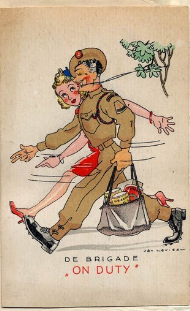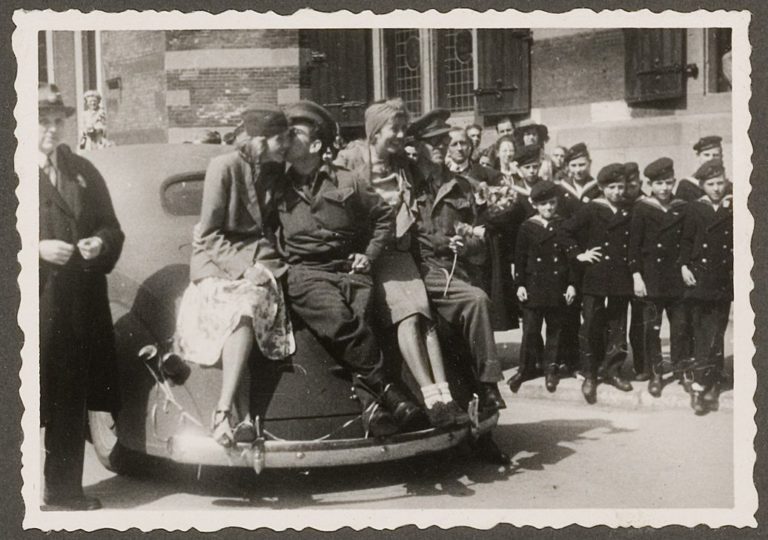A special group within the post-World War II Dutch baby boom were children fathered by the Allied soldiers, our liberators. These are the “liberation children” (in Dutch, “bevrijdingskinderen”).
Allied soldiers
The Allied soldiers who arrived in the Netherlands were healthy men who looked handsome and heroic in their uniforms. And the cigarettes, chewing gum and chocolate in their pockets added to their appeal. With the last fighting done, these Allied soldiers were in need of diversion.
And young Dutch women had not had interesting male company for some time, as most Dutch men between 18 and 45 had been in Germany as labourers or as prisoners of war, in hiding in the east or north of the Netherlands, or had hardly been out in months because of raids by the Germans.
Even in the last months of the war when liberation was on the way, there had been little entertainment in The Hague. You were not allowed on the street in the evening, and at home there was little to do. Without electricity, there was no radio, nor light to read by. Food and heating fuel remained hard to obtain. Without food and in the cold the atmosphere at home must have been very tense.
Moral decay
In the newspapers, there was much commentary on the free relations of Dutch women with Allied soldiers. For example, on 31 May 1945, Het Binnenhof (at that time the ‘Roman Catholic Daily Newspaper for ‘s-Gravenhage and surroundings’) featured an editorial with the title “Women’s honour”.
But he goes on to warn that this momentary intoxication would result only in the moral misery of failed lives and ruined souls. ‘May the parents watch closely!’
Prophylactics
It must be said that these governments did not do this primarily to prevent pregnancies among women in liberated areas. Rather, the purpose was to prevent major outbreaks of venereal diseases (VD) in many army units, as these diseases affected the fighting strength of the troops.
Liberation children
Despite army-issued condoms, an estimated 7,000 children conceived by Allied soldiers were born in the Netherlands. It took some time before there were enough ships to bring all Allied soldiers, especially Canadians, back to their country.
But many liberation children never knew their fathers or did not know them until much later. On Youtube you can find a very interesting documentary about this so called ‘Bevrijdingskinderen‘ (in Dutch).
And there you will also find recordings of a song that was very popular at the time: ‘Trees heeft een Canadees (‘Trees has a Canadian’ – Trees is a first name, short for Teresa).
Do you want to know more about The Hague during the Second World War? I have a special walk and a bicycle tour with this theme.








15 thoughts on “Liberation Children”
A very interesting item – my father was stationed in Noord Brabant towards the end of the war as an 18 year old UK soldier and spoke fondly of his time in the company of welcoming Dutch families.
But he always denied that we’d ever find Dutch siblings!
Hello Doreen,
My mother lived in North Brabant when I was born. I discovered on my 75th Birthday, when my sister and daughter were with me and the 3 of us were working on our DNA’s that the father I had known all my life was not really my father at all., my DNA showed that my father was Canadian.
I am now trying to work out how to connect with my real father. As I am now 75, born in the village of Deurne, North Brabant…., now an Australian, living in New Zealand, , I realise that it is quite possible that my father is either deceased or well into his 90″s. and may have family living in Canada still. Perhaps you may be able to assist in some way. Thank you
I have no facilities to assist you in your search, but you might try to contact this lady: https://bevrijdingskinderen.nl/zoekbureau/
Hello Doreen,
My grandfather, a Canadian Soldier, was in Holland during WW2, and fathered a child there. My mother and I have been trying to find her sibling. I don’t have much to go on either.
Tracy
Adrienne, have you had your DNA tested?
My father was one of the very brave, handsome, charming and deliriously happy men who liberated Holland, and I would not be surprised to have siblings in Europe. In fact, I would love to know.
If you Google HOLLAND LIBERATION CHILDREN,
you will find more information that may be helpful.
Kathleen Julien
Vancouver Canada
I just found a second cousin through DNA who is a
Liberation Child. I was quite surprised to find out that there are relatives in the Netherlands. My family is English on my mother’s side.
Hello,
My father was fighting in France and Holland in 1944/45. He spoke about a Dutch woman who he loved but left behind but never mentioned the post that he may have fathered a child. If he has then he was unaware. I know that he would have returned after the war if that had been the case,
A seed of doubt had been planted in my mind however when someone told me that she was sure that my father’s name and photograph appeared in a programme in 2003/4 regarding “liberation children”. Unfortunately he died before I could ask him for details.
Is there anyone that I could contact to investigate this please?
My dad was at Appeldoorn and saw the signs. He was not on them. He spent most of his time in Njmegan. I know if we had a brother or sister we would welcome them with open arms. My father passed away years ago but would love to share our memories and medical info with them.
Hello, my grandfather Charles Edgar Arthur a Canadian soldier married a Dutch woman during the war but, unfortunately he was already married with a wife and two children in south America. At the time, many soldiers like my grandfather being far from home for years with death just around the corner felt the compulsion to enter into some sort of life affirming relationship. However, he made it back to Canada and brought his original family to Montreal and had a relatively good life. However, every now and then he would look into a dresser drawer and pull out a old black and white photograph of that Dutch girl and lamented what could have been.
Thank you for sharing this story. Do you know what happened to the Dutch woman?
My father served in Holland with 17 Royal Canadian Artillery in 1944/45. I’ve just now learned that I have a older, half brother that was fathered before my Dad was badly wounded and repatriated to Canada. A letter from this son looking for his Dad was received by my paternal aunt some years ago but was not shared with me. My Brother would be in his early 80s and hopefully still with us.
I would love to find this gentleman and his family.
Thank you for this article, Jacqueline .
I’ve only just learned from a paternal relative that I have a half-brother born to a Dutch lady and my father, who served with the Canadian military during the liberation of Holland. He was seriously wounded in action and evacuated back to Canada in 1944. It’s my understanding that their son made contact with my aunt some years ago in order to find his father, however the letter is lost and my aunt has passed, so I have nothing more to go on in my search. I’ve ordered a DNA report which may uncover something, and I truely hope it does. I also know that these souls may not wish contact, and that is something to be absolutely respected.
I also wonder if there are any groups and organizations still offering connection assistance, as all that I’ve found online seem to be inactive. Cheers
I’m sorry, I don’t know of any organizations.
Hi Neil , just wondering if you ever found an organization to help make these connections.
My grandfather Albert Stave who is a Canadian but was with British Army during the liberation of the Netherlands had a child with women named Trudie and brother named Vensel and a dog named Dicky . Have very little info but first names and some pictures , been searching for DNA matches for years without any results. My grandfather has North American Indian blood so have using that when viewing DNA results.
Thank you
During the late 1980s or early 1900’s someone called my mom’s house looking for information on my uncle . Mom didn’t know what to do and she just said he had passed away. We never heard anymore but I am very willing to give more information about him. His name was Murray Inkster from Paynton, Saskatchewan Canada. He was there during the liberation. Please feel free to contact me.